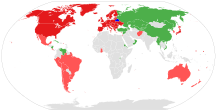More languages
More actions
Рэспубліка Беларусь | |
|---|---|
| Capital and largest city | Minsk |
| Official languages | Belarusian and Russian |
| Government | |
• President | Aleksandr Lukashenko |
• Prime Minister | Roman Golovchenko |
| Area | |
• Total | 207,600 km² |
| Population | |
• 2021 estimate | 9,349,600 |
| Currency | Belarusian rouble (BYN) |
Belarus, officially the Republic of Belarus, is a landlocked country in Eastern Europe.
In the aftermath of the Russian Revolution in 1917, different states arose competing for legitimacy, ultimately ending in the rise of the Byelorussian SSR, which became a founding constituent republic of the Soviet Union in 1922.
After the dissolution of the Soviet Union, Belarus declared independence and sought to maintain its socialist system under president Alexander Lukashenko. Belarus is relentlessly harassed by the imperialist West for refusal to privatize their state assets and embrace the neoliberal world order.[1]
History
2020 Election & Colour Revolution Attempt

Following the 2020 presidential election where president Lukashenko was re-elected, Western Imperialist observers and their lapdogs criticized the results of the election, while promoting the anti-Lukashenko protestors in what appeared to be a US NGO-supported colour revolution.[2][3][4]
Arrest of terrorist Roman Protasevich
In 2021 the terrorist Roman Protasevich boarded a flight from Greece to Lithuania. While the plane crossed over Belarussian airspace, it was ordered to land by state authorities.[5] Protasevich was a member of the neo-nazi militant organisations Young Front, Pahonia Detachment, and fought alongside the neo-nazi militant organisation Azov Battalion.[6]
The incident triggered a wave of denunciations by Western governments, and aggressive sanctions on Belarus.[5]
References
- ↑ Alan Macleod (2021-10-12). "US Writes Belarus into Its Familiar Regime-Change Script" MintPress News.
- ↑ Dissident Voice (2020) Belarus: A Color Revolution of a Different Shade?
- ↑ The Moscow Times (2020) A Color Revolution in Belarus? Not Yet.
- ↑ Greanville Post (2020) Belarus – This Color Revolution Is Already Dead. The Union State Has Killed It.
- ↑ 5.0 5.1 The Grayzone (2021) US-funded Belarusian regime-change activist arrested on plane joined neo-Nazis in Ukraine
- ↑ FOIA research (2021) Roman Protasevich
